One reason for the City of Lansing's current budget problems is that over a 6-month period 26 years ago, 144 city employees - 12% of the City's workforce (LSJ 2/1/2001) - retired with jacked-up pensions and generous health insurance. Only 17 of them were over age 60 at the time. 65 were under age 50. Here is a list of all 144 of them. The "early retirement" caused a public uproar, with three lawsuits, an effort to recall the council members who voted for it, and an ethics investigation, but it might have gone unnoticed had the mayor and city clerk not been among the retirees.
That extra 5 years of service credit was not just for the pension calculation, the formula for which was years of service times FAC times the multiplier. It could also be used in determining when an employee could retire. Take, for example, Steve Duarte. He was 45 years old and had worked for the city for 18 years. A Teamster hired before October 1, 1990 could retire when the sum of his age and his years of service equaled 65. The sum for Duarte - who, of course, was not a Teamster - was 63, but the extra 5 years would have put it over 65. Actually, when that "65 and out" provision for Teamsters was negotiated in 1990, executive and exempt employees - that is, department heads and other non-union employees - were included. And back in January 1985, the city council OK'd personnel rules that tied executive and exempt employees to contracts negotiated with the union (LSJ 1/11/1993). So Duarte did qualify.
That 1990 agreement negotiated with the Teamsters had another provision that was used to justify the 1992 early retirement offer. Employees hired after 1990 would be in a defined contribution rather than defined benefit plan. They would get no pension, but the City would contribute an amount equal to 5% of their salary to their retirement savings account. This was expected to be much less expensive, with no continuing obligation for the City after the employee retired. Closed sessions. The plan was presented to the city council in two closed sessions, March 28 and April 9, by finance director Steve Duarte and budget director Jan Lazar, who neglected to mention that they were among those eligible for the buyout. (LSJ 8/3/1993) The council at that time consisted of council president Jim Crawford, vice-president Mark Canady (at large), Alfreda Schmidt (2nd ward), Lucille Belen (at large), Charles Ford (4th ward), Bob Brockwell (at large), Ellen Beal (1st ward) and Tony Benavides (3rd ward). Both sessions were closed to the public because a labor contract was being discussed. Ellen Beal later said "Council members were told not to discuss the plan with anyone and any notes they took were collected after each meeting." (LSJ 1/11/1993) Council members were shown a list of employees eligible under the plan and were aware that 3 of their own qualified. But only Canady noticed that the mayor and the city clerk were on the list, which contained at least 143 employees. (LSJ 2/8/93) Canady didn't speak up about it because he didn't think they planned to take the offer. The only employee eligible for the buyout who was not on the list was Steve Duarte. (LSJ 2/8/1993). In a July 3, 2012 Freedom of Information Act request, I asked the City for the minutes of the March 28 and April 9 meetings, but the city attorney's office denied my request saying they did not exist. They did exist at one time, however, because that 2/8/1993 article in the LSJ says they obtained the documents with a FOIA request. I wrote LSJ editor Mickey Hirten asking if they have them and got no response. Formal approval. The plan was approved by resolution at the Monday night council meeting on April 13, 1992 (meeting minutes). Here is Resolution 201 (it is on the 4th page of the minutes):
Prior to the vote, during the public comment segment of the meeting, several people spoke about the plan:
Note that none of the "public" seemed to be aware that this plan included elected officials. Steve Duarte certainly knew and councilman Canady said later that he knew, but they didn't bring it up. The resolution itself does not specifically mention elected officials, but neither does it provide detail about the incentive (an extra 5 years service and a .025 increase in the multiplier.) Although it was McKane who originally proposed the buyout, he said he didn't know elected officials were included until after it was approved. (LSJ, 11/26/1992) The first LSJ article I can find that mentions that elected officials were included is dated 5/25/1992. It says "Rumors about who will take the retirement have reached as far as the mayor's office."
Later in the meeting, executive assistant to the mayor Cleophus Boyd spoke about the plan:
On April 16, a memorandum of understanding providing details of the "voluntary reduction in force" was signed by city and union officials.
In response to a November 11 LSJ editorial urging the mayor to hurry up and make up his mind, I expressed my outrage in a letter to the editor. I was not a Lansing native and until then had paid little attention to local politics. I grew up in South Haven, but went to school at MSU and had been living and working in Lansing for several years. On November 25, six days before the deadline, mayor McKane announced his retirement saying he'd chosen to put his family first this time rather than the city. He also said city clerk Blair, not present at the announcement, would retire. (LSJ 11/26/1992) Blair left the next day to represent Lansing at a National League of Cities conference in New Orleans using $500 of City funds. (LSJ 11/24/1992) In all, 144 employees announced their retirement, including these upper-level managers:
Here is a list of all 144 retirees.
At the December 7 meeting, the city council voted to ask the state attorney general to review the retirement plan. Councilwoman Ellen Beal also moved to suspend the pension bonuses for McKane and Blair until the attorney general made his ruling, saying "I don't think the citizens should have to band together, raise money and hire a lawyer to do our work. We should repeal this." Her motion got support only from Alfreda Schmidt. (LSJ 12/8/1992) Beal must have been aware of what happened 7 years earlier, when an early retirement on a smaller scale was proposed. In July 1985, the city council passed an early retirement plan that targeted 26 executive and exempt employees, allowing them to retire at any age with 8 years of service. Among them were eleven of the employees who retired in 1992, including Steve Duarte and Jan Lazar. This time, however, a few city employees took a stand against it, organizing a petition drive and raising money for an attorney to represent them in a lawsuit. Two months after the plan was passed, the city council rescinded it, in part on the advice of an outside attorney who said the public wasn't properly notified of the meeting in which it was passed. (LSJ 1/11/1993) Rarely do you see pubic employees heroically taking on management in this manner. For more, see Lansing's Early Retirement of 1985. Citizen action. By the end of December, two lawsuits were filed, one by Kenneth Vaughan, a auto mechanics instructor who'd only recently began attending Monday night City Council meetings, and one by the UAW International Union. UAW Local 2256 represented about 325 city employees. In addition, the city Ethics Board voted to look into the matter. (LSJ 12/24/1992) There were three legal issues. Quoting the LSJ 12/24/1992:
It soon became clear that those 144 employees would be missed. The plan was to replace only about half of them, and recruiting replacements would take time. Federal community development grants were delayed because the Planning and Development department didn't have staff to prepare specifications. Streets weren't getting plowed. Recreation programs were cut. Soon Mayor Crawford was saying the City should consider hiring retirees back on contract.
Another group called Citizens for a Better Lansing, which had existed long before the early-out, proposed a petition drive to remove those council members who voted for the early retirement and would not be up for election in the fall of 1993: Canady, Brockwell and Benevides. To run the effort, a separate group called Clean Sweep was spun off, headed by John Addis. Several members of the Concerned Citizens to Save Lansing group also joined Clean Sweep, including me.
Election candidates. The early retirement scandal led a lot of Lansing residents to think they could do a better job than current city leaders. Eleven people circulated petitions for mayor, including Ken Vaughan, Charles Ford and state representative Dave Hollister. Eight ran for the 4th ward seat being vacated by Charles Ford, including me. (I came in 7th in the primary.) Lloyd Teets ran for city clerk against Sue Eby and Marilyn Slade, who'd been appointed to replace Jim Blair. Twelve people ran for city council at-large seats, including Alex Bolt and Mary Massoglia, both members of Concerned Citizens to Save Lansing. In May 1993, Vaughan reduced the scope of his lawsuit, dropping 142 early retirees and leaving McKane and Blair, the only elected officials. The contention was that they received retroactive compensation, which is prohibited by the Michigan constitution. (LSJ 5/6/1993) Also in May, former labor relations director Richard Putney filed suit against the City. He claimed that he was fired because he publicly opposed the early-out; that he was punished for opposing violations in the city's overtime rules; and that city officials acted to keep him from getting a job as labor negotiator for the Fraternal Order of Police. (LSJ 5/7/1993)
It didn't help Crawford that McKane had picked him as his successor. In 1992, McKane had said "I was very careful to choose my date of leave-taking so that Jim would have the job for a year so he would be solidly in the job . . . I'm the self-appointed, unofficial campaign manager for Jim Crawford until he gets a real one." (LSJ 5/25/1992) It didn't help for him to continue to insist that the early-out was beneficial (LSJ 7/13/1993), or to throw a fit when his name was among 13 mentioned in a Board of Ethics meeting as possible targets of its investigation. (LSJ 7/2/1993) And it didn't help when Hollister said McKane's and Blair's bonuses should be taken away and Crawford insisted that "Once you grant a benefit, it cannot be taken away. (LSJ 8/23/1993) On July 12, Judge Carolyn Stell dismissed Vaughan's lawsuit, saying he sued after the deal was done and failed to prove taxpayers were injured by the early-out. The bill for attorneys who defended the city in the lawsuit was $125,000. (LSJ 7/13/1993) The fact remained, however, that the bonuses for McKane and Blair appeared to be unconstitutional. Article 11, Section 3 of the Michigan Constitution says:
Ethics Board. On September 30, 1993, the Ethics Board released its report. Among its findings:
Asked if he would do anything differently if he could do it over again, council president Mark Canady said, "The only thing I would have done differently is not believe McKane and Blair when they said they wouldn't take early retirement, and put something in writing guaranteeing that. The only thing I was guilty of was believing them." (LSJ 10/2/1993) Stuart Dunnings Jr. was the only one of the 5 board members who did not approve the report. He said the board had improperly addressed issues that were legal, not ethical. (LSJ 10/1/1993) Over the objections of members Marilyn Slade, John Mertz and Don Cook, Dunnings submitted a dissenting opinion. Mertz later told the Capitol Times "It is apparent that Stuart Dunnings was a council plant on the board. He continually threw up roadblocks to the investigation." In early October, the Ingham County Board of Commissioners asked county prosecutor Don Martin to review the ethics report to see if any laws were broken. At the same time, the City Council committee hired East Lansing lawyer George Brookover to review the report and advise the council on what action should be taken. On October 27, the Lansing State Journal endorsed Jim Crawford for mayor, saying he'd been effective in his 10 months on the job. At the November 1 City Council meeting, the day before the election, city financial officials presented a report saying the city would save nearly $15 million over 5 years as a result of the early retirement. $3 million of that would come from not filling 73 of the vacated positions. When questioned about the extra pension costs, finance director Doug Rubley said money for those benefits already existed and would have been used for that purpose anyway. (LSJ 11/2/1992) A year later, he qualified his statement saying the accrued benefits were funded, but not the extra 5 years of service and the increase in the multiplier. (LSJ 11/21/1993) According to my calculations, the total of all 144 pensions calculated without the incentive is $3,104,962. The total with the incentive is $4,244,979. The difference is $1,140,017 per year. And 72 fewer employees are paying into the system. Election results. Lansing voters made their feelings clear. Of all the city officials up for election, only councilman Rick Lilly, who had been appointed to replace Crawford, was not defeated:
Paul Novak won the 4th ward seat Charles Ford gave up to run for mayor.
Dumping Crawford, Schmidt and Belen was thus far the only revenge enjoyed by Lansing citizens. Vaughan's lawsuit had been thrown out and the Clean Sweep Committee had failed to collect enough signatures to recall Canady, Brockwell and Benevides. But less than a month after he took office, mayor David Hollister fulfilled a campaign promise and cut off the pension bonuses for McKane and Blair. (LSJ 1/31/1994) The straight-life equivalent of McKane's pension went from $53,362 to $39,443, a $13,919 drop. Blair's went from $31,134 to $22,407, a $8,727 drop. Editors of the Lansing State Journal disagreed with Hollister's action, saying that it undoubtedly would "be a drag on the impetus toward making Lansing a more vibrant, viable city of the 21st century . . ." (1/31/1994) Section 415 limits. Right around the first of the year, Bill Barkyoumb, a co-worker at the state Office of Retirement Systems, told me that there was another problem with the city's early-out. He said pensions for several retirees exceeded limits in Section 415 of the federal tax code. That meant nothing to me, but I did a little research and on January 13, sent a Freedom of Information Act (FOIA) request asking for information on each of the retirees whose pensions exceeded the limit. On January 27, Chief Assistant City Attorney Melvin McWilliams responded with a list of 16 retirees, including Steve Duarte and Jan Lazar. (After he retired from state government, Barkyoumb went to work for the City finance department in 1997. He died after retiring 2018.) The following is from an analysis of the 415 limits done by Gabriel, Roeder, Smith & Company in April 1992. GRS at that time was actuary for both the state and the city of Lansing.
On February 13, 1994, as president of Concerned Citizens to Save Lansing, I sent a letter to the mayor and the council questioning the propriety of the excess payments. The matter was referred to the Ways and Means committee, which in turn referred it to the city attorney. An April 14, 1994 LSJ story says that the resolution which authorized the early retirement said that pensions would be subject to Section 415 limits. It did not. The Memorandum of Understanding signed April 16, 1992 did, but Resolution 201, passed April 13, 1992 did not. The limit was stated clearly at the top of the third page of this presentation for prospective participants:
The Section 415 pension amount limit was also mentioned on the pension estimate request, and specific limits by retirement age were provided in the GRS analysis, which was provided to prospective retirees. In any case, Steve Duarte had immediately set about circumventing the limits. GRS, the actuary, told him the excess payments could be paid out of the general fund, and after consulting city attorney Al Knot, a trust was set up for that purpose. In the spring of 1993, the new administration discovered that the payments had not been appropriated. Outside attorneys Miller, Canfield, Paddock and Stone saw problems with the documentation, but agreed that the payments could be made out of the general fund. The real problem is that the City Council knew nothing about it. (LSJ 4/14/1994) In March, McKane and Blair sued the city for cutting off their retirement bonuses, claiming they were denied due process. In April, the city countersued. In an April 20 article, reporter Tim Makinen of the Lansing State Journal said:
In August 1994, the city attorney's office found what Mayor Hollister later characterized in a letter to Ingham County Prosecuting Attorney Don Martin as the "smoking gun": a memo dated 7/21/1992 from Melvin McWilliams, Chief Assistance City Attorney, to Steve Duarte urging him to get the City Council to modify the retirement system ordinance to reflect the early retirement provisions. The proposed ordinance modification was attached. Duarte apparently ignored him, prompting McWilliams on 12/10/1992 to send City Attorney Al Knot a memo complaining that his draft ordinance had still not been forwarded to the City Council. "[I]t is reasonable", he said, "for the Board of Trustees [of the Employees Retirement System] to expect the Council to give it clear ordinance authority since exempt and elective officials aren't covered by the collective bargaining memorandum of understanding." Duarte did finally forward the proposed ordinance amendment to McKane, but not until 12/29/1992 - the first day of McKane's retirement. Note that the proposed ordinance modification provided no more detail than Resolution 201. Prosecutor Martin declined to convene a grand jury, as Hollister had asked, because although it appeared the city charter had been violated, there was no evidence that a crime had been committed. (LSJ 9/13/1994) On November 14, 1994, City Council cut off the payments in excess of the Section 415 limits. Thirteen of the 16 sued (LSJ 11/15/1994), and in May 1995 the payments were restored for all but Lazar and Duarte. In addition, the City was ordered to pay damages, interest and $45,000 in attorney fees. (source: 8/25/1995 letter to LSJ from Robert Peck, former Data Processing director and one of the 16)
On April 17, 1995 City Council passed an ordinance retroactively authorizing the early retirement of 1992, but unlike in the original resolution, elected officials were not included. McKane and Blair were the only elected officials who had taken the offer. The ordinance was needed to allow the retirement board to continue paying the pensions for the other 142 early retirees. City Attorney Jim Smiertka had this to say about the early retirement: "This is about power, greed and self-interest. . . There was a lack of information, a steam-rolling of the project, compounded by no checks and balances." (LSJ 4/18/1995) In the end, cutting off the bonuses for McKane and Blair was the only take-back that stuck. They took their case all the way to the Michigan Appeals Court. On January 31, 2001, the court agreed with two federal courts and the Ingham Circuit Court that the retirement incentive should not have been offered to elected officials. Long before that, Duarte (LSJ 2/1/2001) and Lazar (LSJ 11/30/95) won their lawsuits to get the amounts in excess of the Section 415 limits restored. And the huge savings that was to come from replacing the early retirees with new employees who would be defined contribution rather than defined benefit? That didn't pan out. Under mayor Tony Benevides, Hollister's successor, most groups were switched back to defined benefit. (Lansing City Pulse, 2/22/2012) Where are they now? Terry McKane's first job after he retired was as a New York Life Insurance representative. (LSJ 2/22/1993) Later, he returned to work as a teacher at Sexton High School. (LSJ 2/1/2001) James Blair became a real estate agent in Lansing. (LSJ 2/1/2001) On May 29, 2013, Mark Canady plead guilty to embezzlement and faces up to 10 years in prison. Steve Duarte went to work for Kent County on September 8, 1997. He is now (July 2019) Fiscal Services Director, with a salary of $171,061.(source) His current City of Lansing pension, which he has received for 27 years as of 7/10/2019, is $56,058 (same as it was in 1992). Jan Lazar became senior vice president of The Mercer Group, Inc. "specializing in finance, fringe benefit design and costing, and compensation and management analysis." She had a part in a documentary called The Water Front about the financial problems of Highland Park. And she is mentioned in this article from the Detroit Free Press: Michigan taxpayers sending 80 officials to Hawaii. I've visited Ken Vaughan a couple of times in the last 10 years in Grand Ledge, where he lives at Serenity Homes independent living community. Health problems keep him from driving, but he is still full of ideas on how to fix problems with government. Sadly, in August 2019, he - at age 88 - and two other male residents were charged with sexually assaulting a young female resident with very low mental capacity. (LSJ, 8/28/19) |
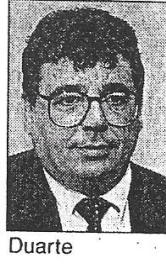 The city was
having budget problems in 1992 and that was the purported reason
for an offer presented early that year to Teamsters union representatives. The offer came from finance director
Steve Duarte. The terms of the offer were incredibly generous.
Teamsters members who agreed before December 1, 1992 to retire by
January 4, 1993 would get their multiplier increased from 2.5% to
2.75% and they'd get an extra 5 years of service credit. Even
Teamsters local president Billy Mendenall told city officials
"you're shooting yourself in the foot on this" (LSJ 1/11/1993).
The city was
having budget problems in 1992 and that was the purported reason
for an offer presented early that year to Teamsters union representatives. The offer came from finance director
Steve Duarte. The terms of the offer were incredibly generous.
Teamsters members who agreed before December 1, 1992 to retire by
January 4, 1993 would get their multiplier increased from 2.5% to
2.75% and they'd get an extra 5 years of service credit. Even
Teamsters local president Billy Mendenall told city officials
"you're shooting yourself in the foot on this" (LSJ 1/11/1993). In a lawsuit
filed in May 1993, labor relations director Richard Putney alleged
that he was excluded from the bargaining session with the Teamsters
and learned the details from an assistant who copied them longhand
from notes brought to the collective bargaining table by Duarte. He
also alleged that his contract, which expired 9/30/1992, was not
renewed because whenever Duarte and budget director Jan Lazar said
the early retirement offer was due to a budget shortfall, he
reminded them that there was a $7-9 million surplus in an account
designated as an "undesignated fund balance". When he did so, they
became "extremely angry and agitated." (
In a lawsuit
filed in May 1993, labor relations director Richard Putney alleged
that he was excluded from the bargaining session with the Teamsters
and learned the details from an assistant who copied them longhand
from notes brought to the collective bargaining table by Duarte. He
also alleged that his contract, which expired 9/30/1992, was not
renewed because whenever Duarte and budget director Jan Lazar said
the early retirement offer was due to a budget shortfall, he
reminded them that there was a $7-9 million surplus in an account
designated as an "undesignated fund balance". When he did so, they
became "extremely angry and agitated." ( When it was time
to vote on the resolution, councilman Ford moved to table the item
for further consideration by the Committee of the Whole. His motion
was defeated seven to one. Councilmember Beal moved to amend the
resolution by striking paragraphs number three and six, which
offered the plan to executive and exempt (non-union) employees. She
withdrew her motion when, she said later, city attorney Al Knot said
that was not possible due to the 1985 rule. The resolution passed
seven to one, with Beal voting against.
When it was time
to vote on the resolution, councilman Ford moved to table the item
for further consideration by the Committee of the Whole. His motion
was defeated seven to one. Councilmember Beal moved to amend the
resolution by striking paragraphs number three and six, which
offered the plan to executive and exempt (non-union) employees. She
withdrew her motion when, she said later, city attorney Al Knot said
that was not possible due to the 1985 rule. The resolution passed
seven to one, with Beal voting against.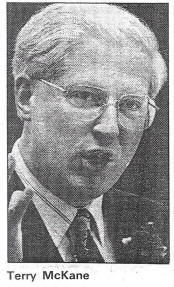 Mayor McKane
retires. On November 11,
1992, the Lansing State Journal reported that Mayor McKane was
contemplating retirement. This was big news; when asked back in May
if he would retire, he'd said "People who have suggested the
possibility as a way of getting rid of me will just have to figure
out another way." By retiring by January 4 rather than a year later,
after he'd finished his third 4-year term of office, McKane would
get $11,000 added to his annual pension. If city clerk Blair took
the offer, he would get an extra $9000. (LSJ 11/24/1992)
Mayor McKane
retires. On November 11,
1992, the Lansing State Journal reported that Mayor McKane was
contemplating retirement. This was big news; when asked back in May
if he would retire, he'd said "People who have suggested the
possibility as a way of getting rid of me will just have to figure
out another way." By retiring by January 4 rather than a year later,
after he'd finished his third 4-year term of office, McKane would
get $11,000 added to his annual pension. If city clerk Blair took
the offer, he would get an extra $9000. (LSJ 11/24/1992) Actually, McKane's bonus was $13,918 when
calculated using his straight life option. He chose a survivor
option. Blair did chose the straight life option and his actual
bonus was $8,727. The largest bonus - $16,164 - was received by
Public Service director Howard McCaffery, age 53, who had 20 years
and 8 months of service. For several years after he retired, McCaffery served on the Employees
Retirement System Board. Second highest was $15,978 for Steve
Duarte. You can see all the bonuses, highest to lowest,
Actually, McKane's bonus was $13,918 when
calculated using his straight life option. He chose a survivor
option. Blair did chose the straight life option and his actual
bonus was $8,727. The largest bonus - $16,164 - was received by
Public Service director Howard McCaffery, age 53, who had 20 years
and 8 months of service. For several years after he retired, McCaffery served on the Employees
Retirement System Board. Second highest was $15,978 for Steve
Duarte. You can see all the bonuses, highest to lowest,
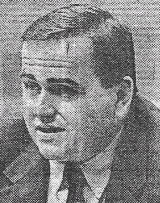 Council president
Jim Crawford (left) took over as mayor and vice-president Mark Canady
became council president.
Council president
Jim Crawford (left) took over as mayor and vice-president Mark Canady
became council president.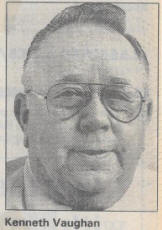
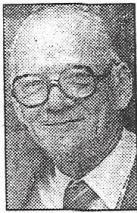 To support Ken
Vaughan in his lawsuit, a group was formed called Concerned Citizens
to Save Lansing. I was a member along with Lloyd Teets (left), a regular at
Monday night city council meeting. Teets seldom missed his chance to
speak at council meetings, and he was both passionate and eloquent. It was Teets who
got Vaughan interested in city government. Also in the group was
Alexander Bolt, who a few years later took the City to court and got
the so-called "rain tax" rescinded.
To support Ken
Vaughan in his lawsuit, a group was formed called Concerned Citizens
to Save Lansing. I was a member along with Lloyd Teets (left), a regular at
Monday night city council meeting. Teets seldom missed his chance to
speak at council meetings, and he was both passionate and eloquent. It was Teets who
got Vaughan interested in city government. Also in the group was
Alexander Bolt, who a few years later took the City to court and got
the so-called "rain tax" rescinded.  City Council
president Mark Canady compared his situation to that of his mother, Hortense Canady, a Lansing school board member who was recalled for
her 1972 vote in favor of busing. (LSJ 3/20/1993)
City Council
president Mark Canady compared his situation to that of his mother, Hortense Canady, a Lansing school board member who was recalled for
her 1972 vote in favor of busing. (LSJ 3/20/1993) Meanwhile, ethics
board chairman John Mertz (right) was having trouble getting his
investigation off the ground. Canady wanted Mertz off the board
because his wife worked for the UAW. Mertz wanted city attorney Al
Knot off the board because Knot admitted that he had known there
could be a conflict of interest issue with three council members,
yet didn't mention it to them or the rest of the council. (LSJ
1/17/1993) Eventually, City Council voted to replace Al Knot on the
ethics board. (LSJ 4/2/1993) Attorney Stuart Dunnings Jr., father of
the former Ingham County prosecutor, was appointed to take his
place.
Meanwhile, ethics
board chairman John Mertz (right) was having trouble getting his
investigation off the ground. Canady wanted Mertz off the board
because his wife worked for the UAW. Mertz wanted city attorney Al
Knot off the board because Knot admitted that he had known there
could be a conflict of interest issue with three council members,
yet didn't mention it to them or the rest of the council. (LSJ
1/17/1993) Eventually, City Council voted to replace Al Knot on the
ethics board. (LSJ 4/2/1993) Attorney Stuart Dunnings Jr., father of
the former Ingham County prosecutor, was appointed to take his
place.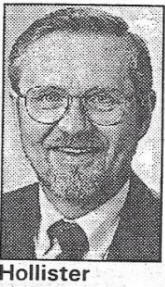 The mayoral
campaign heated up, with Hollister and Crawford favored to win the
primary. Hollister's campaign literature said that people "want a
government that outlaws secret retirement deals between Terry McKane
and his hand-picked successor . . . " In an interview with Patrick
Diehl in the June edition of the Capitol Times, he said a new team
was needed to reestablish citizen trust and integrity. But despite
Hollister's liberal credentials, he expected to split support from
organized labor with Crawford. The early-out "was a real sweetheart
deal for them and they are not going to stick it in [Crawford's]
eye" he said. "[But] when you look at the twenty-five million dollar
deficit coming up in the next couple years, and the cost of health
care, he's going to have to make some tough decisions. . . . And
labor will have to be at the table trying to figure out how to
handle that."
The mayoral
campaign heated up, with Hollister and Crawford favored to win the
primary. Hollister's campaign literature said that people "want a
government that outlaws secret retirement deals between Terry McKane
and his hand-picked successor . . . " In an interview with Patrick
Diehl in the June edition of the Capitol Times, he said a new team
was needed to reestablish citizen trust and integrity. But despite
Hollister's liberal credentials, he expected to split support from
organized labor with Crawford. The early-out "was a real sweetheart
deal for them and they are not going to stick it in [Crawford's]
eye" he said. "[But] when you look at the twenty-five million dollar
deficit coming up in the next couple years, and the cost of health
care, he's going to have to make some tough decisions. . . . And
labor will have to be at the table trying to figure out how to
handle that." Sue Eby didn't
remain in office long after it was revealed that she owed the city
over $31,000 in back taxes on properties she owned. As a candidate,
she had signed an affidavit saying "I am not in default at the time
I am executing this affidavit on any of my financial obligations to
the city including but not limited to property taxes." (LSJ
11/18/1993) Marilyn Slade got her job back.
Sue Eby didn't
remain in office long after it was revealed that she owed the city
over $31,000 in back taxes on properties she owned. As a candidate,
she had signed an affidavit saying "I am not in default at the time
I am executing this affidavit on any of my financial obligations to
the city including but not limited to property taxes." (LSJ
11/18/1993) Marilyn Slade got her job back.
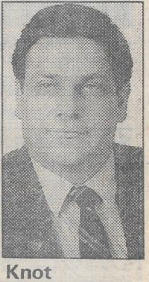 Other lawsuits by city employees included one by former city
attorney Al Knot, who wanted a temporary halt to an investigation by
the Ethics Board of his failure to inform the City Council about the
details of the early retirement (it was rejected in federal court in
early November, 1994) and one by former executive assistant Cleophus
Boyd over a reduction in his severance package. (LSJ 11/15/1994)
Other lawsuits by city employees included one by former city
attorney Al Knot, who wanted a temporary halt to an investigation by
the Ethics Board of his failure to inform the City Council about the
details of the early retirement (it was rejected in federal court in
early November, 1994) and one by former executive assistant Cleophus
Boyd over a reduction in his severance package. (LSJ 11/15/1994)